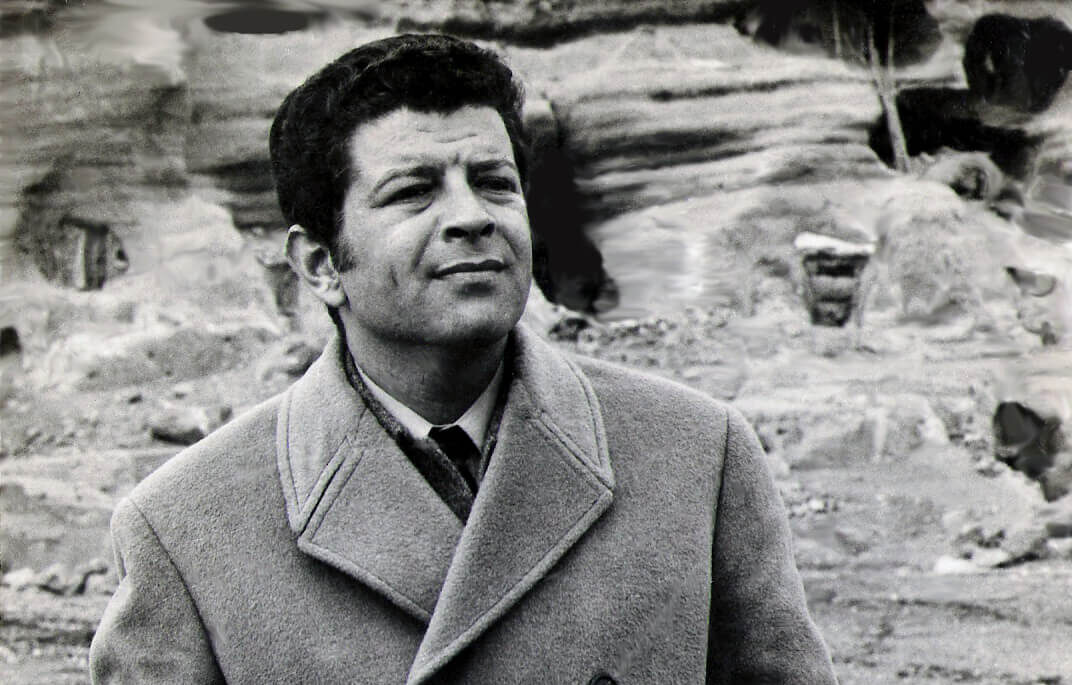GIORGOS ZACH. ASARIOTAKIS (1936-2019)
He was born on 18 September 1936 in Heraklion. His parents' house was on Taxiarchos Markopoulou Street. His father, Zacharias, came from the village of Kera in Lassithi, while his mother, Anna, née Papadakis, came from the village of Stamni in Pediados. In his early years he lived between the area of Ag. Minas and the central market (Grusouzadika) where his father kept a restaurant.
After primary school (Standard) he finished the technical school of Heraklion (Chamber of Commerce and Industry). At the age of 18 he passed the exams of the School of Fine Arts of the Technical University of Athens. In the same year he was admitted to the Higher School of Cinema and Theatre "Stavrakos" in the stage design department. At the urging of his professors Gregory Grigoriou and Karolos Koun, he transferred to the director's department. From the second year, alongside his studies, he worked as an assistant director alongside well-known names of the time (Greg Tallace, Yannis Dalianides, Jules Dassin, Melina Mercouri, Aliki Vougiouklaki, Barcoulis, Gionakis, Orestis, Avlonitis, Rizos, etc.).
In 1958, he shot the documentary "Colourful Stripes" on 16mm film, for his degree exams, which secured him a scholarship for a postgraduate degree in France. He serves his military service as a reserve officer in the Special Forces (2nd Commando Squadron).
In 1961 he went to Paris where, along with the cinema, he attended painting classes with the famous painter Soungouroff and choreography classes at the school of Rolan Peti. From Paris he sends reports on artistic subjects to the Athenian press. Returning to Greece, he directs the play "Rainmaker" by the American writer Richard Nash.
At the age of 26, the company "Orestis Films" commissioned him to make a documentary based on the book "Captain Michael" by N. Kazantzakis. This documentary is shot entirely in Heraklion on Negatif 35mm black and white film, entitled "Proud Racza". With this documentary Nikos Xylouris became known in artistic circles and to the general public, resulting in his later brilliant career.
Although there were praiseful reviews for the final result, he considered his work mediocre and, in combination with the general sloppiness that prevailed in Greek cinema at the time, he decided to leave Athens and settle permanently in his hometown, working in similar professions.
He sets up an office in Heraklion (Kallergon Square) with the purpose of distributing the films to portable projection crews, as well as to the cinemas of the whole of Crete. Almost all the companies producing and importing motion pictures entrust him with their representation for the whole of Crete.
In 1967 he decides to deal with the entertainment business and creates the "Auto Club" in Knossos Avenue. It is the first Pop-Rock Club to be created in Crete and from its dance floor, well-known bands of the time such as "Olympians", "Nostradamos" etc. appear, while at the same time it helps young musicians and singers to start a successful career.
In the same year he discovers Matala and creates the tavern/cafeteria "Delphini". The following year, with the help of the young journalist Nikos Hardavela and the magazine "Icons", he organizes the "World Hippies Conference" on the beach of Matala, so that the area is shown by all the international media and becomes known in Greece and the whole world, while the director Yannis Dalianidis shoots a film in Matala with Rena Vlahopoulou as the leading actress.
The following year, the first Night Club with a live program called "Zorbas" opens in Knossos Street in Heraklion. In this place a deer folk program is presented, accompanied by a show. For the summer months, he creates the summer "Zorbas" on Karteros beach, where some of the most famous names of Greek music appear, while impressing with his original decor. At the same time, during the same season, he manages various entertainment venues, such as the "Hermis Club" in the hotel of the same name in Agios Nikolaos, the "Malia by Night" in Malia and the "Sirines Club" inside the "Sirines" hotel.
In 1976 he creates a folkloric group with the name "Creta Folkore Group" which presents folkloric performances in various tourist sites. From the first year of operation of the "Creta Maris Hotel" he takes over the management and organization of the Night Club of the same name, presenting for two years a live folklore program.
In 1978 he starts operating the Night Club "Akti Zeus", a place that for a decade dominated the artistic events of Crete. All the great names of Greek music (George Zambetas, Grigoris Bithikotsis, Stratos Dionysiou, George Marinos, Harry Klynn, etc.), the biggest ballets and the biggest attractions of Europe passed through the "Akti Zeus". He was a pioneer for his time and many clubs in Athens copied his style.
In 1979 she organizes for the first time in Crete, with the collaboration of the newspapers "Apogevmatini" of Athens and "Patris" of Heraklion, the Pancretan Pageant "Miss Crete". This competition has become an institution which Crete TV has included in its program from the first year of operation.
1981-1982 he takes over the management and operation of the famous "Ariadni" centre where Viki Moscholiou and her partners perform for a whole winter season, offering high quality entertainment in Crete.
In 1985 he creates from the ground up on Ellinoperamata beach the "Petalo" (winter - summer) centre, which dominates the nightlife of Crete for several years. Today it still operates under the name "Olympia Palace".
In 1988 he secured a swampy area in the area of the Almyros River and transformed it into the famous "River Center" (disco/cafeteria/restaurant), which for many years was the favourite hangout of Heraklion residents and foreigners.
In 1994 he establishes a new artistic institution with the cooperation of Crete TV. This is the "Pancretan Vocal Competition". A competition that has so far brought out several young artists in the field of singing.
He has written the documentary novel "Dachau" which has been published in serial form on the front page of the local newspaper "Patris", while many of his texts have been published in the local and Athenian press. In his archive there are many unpublished, poetic and literary essays. Since 1960 he held a journalist's identity card signed by the late Athenagoras Myconiatis.
He was married twice, to Voula Kapsalaki with whom he had a daughter, Anna, and to Despina Triantafyllou with whom he had two sons, George and Lambros.

